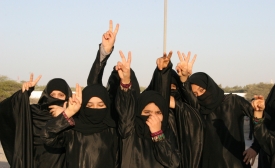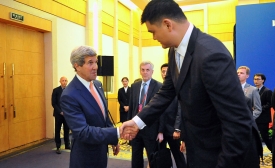isil
The war on Daesh (the self-proclaimed Islamic State of Iraq and the Levant) in Iraq has resulted in the decline of America’s political role in pinpointing paths of events in that country. The statements issued by some Iraqi politicians have become louder with more of an edge in criticising and degrading the US’s role in fighting the terrorist organisation.
More military and diplomatic support for Arab dictators not only keeps damaging the U.S.’ image among democratically-oriented Sunnis, but also fans the fire raging in the hearts and minds of the Shia population.

Javad Rad says the U.S. is "betting on the wrong horse" in the Middle East.
According to former CIA officer, the US asking Sony Pictures Entertainment to find a Muslim version of Western rock musician Bob Geldof to counter Islamic State propaganda demonstrates that US President Barack Obama lacks a coherent strategy to address extremist information operations.
As part of the State Department’s ongoing efforts to counter violent extremism, 11 high-level government representatives from Counter-ISIL Coalition countries will begin a U.S. exchange program this week aimed at discrediting and de-legitimizing ISIL’s brand of violent extremism.
H E George Hisaeda, Ambassador of Japan to Oman, believes diplomacy is not exclusive to diplomats. “Grassroots or people-to-people diplomacy is increasingly important in the interconnected ‘global village’ of modernity,” he says.
As General Myers, the former Chairman of the Joint Chiefs of Staff, has observed, “every dollar spent on the soft power of ideas is worth 100 in hard power.”(...) In the years ahead, no matter who controls the White House or Congress, our nation must focus more of our efforts on soft power.

U.S. public diplomacy tends to react to situations, rather than taking initiative, says Philip Seib.







